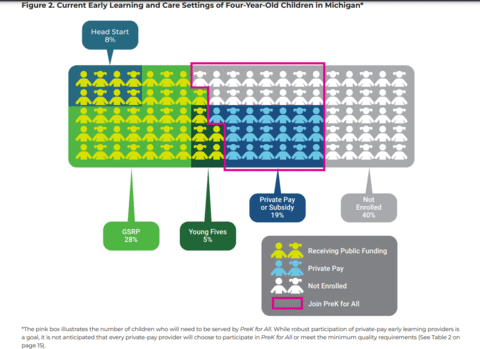State’s early education plan could shutter private child care
Michigan seeks pre-kindergarten for all 4-year-olds
The recently created Michigan Department of Lifelong Education, Advancement and Potential is jeopardizing businesses that provide child care and creating cradle-to-grave government programs, a private education expert warns.
“I’m establishing MiLEAP today because we need to get every kid started early,” Gov. Gretchen Whitmer stated when announcing the program last year, “in pre-K, so they succeed in kindergarten, have paths after graduation to get higher education tuition-free, and forge strong partnerships with our employers so they can get a good-paying, high-skill, and in-demand jobs.”
There were 8,081 child care programs operating statewide at the end of 2023, according to MiLEAP.
But government control of private sector services brings considerable unintended consequences, Kerry McDonald, a senior fellow and leader of the Education Entrepreneurship Lab, told Michigan Capitol Confidential in an email.
“In cities that have introduced universal government-run preschool programs, private preschool providers have been pushed out of business, creating less diversity of options for families,” said McDonald. Even the possibility of government programs could discourage current preschool providers from expanding or dissuade others from starting a program, McDonald said, “which can exacerbate existing shortages and drive preschool prices higher.”
McDonald recommended instead reducing the barriers that education entrepreneurs encounter. This would encourage a “variety of market-based education options and drive prices down.”
During 2025 budget negotiations, House Democrats tried to remove a requirement that districts provide 30% of Great Start Readiness Program funding to private child care providers. Another lawmaker, in the 2023-23 legislative term, introduced a requirement to make a private provider’s salary at least equal to the average Readiness Program salary.
A coalition of nearly 1,200 child care providers wrote a letter to legislators in May opposing the provisions. Private and nonprofit organizations provide nearly one-third of child care statewide, according to the letter. The expansion of taxpayer-funded preschool for four-year-olds strongly incentivizes parents to leave private preschool programs.
The combination of private providers raising prices to cover expenses coupled with state funding cuts, if enacted, could jeopardize a heavily regulated industry.
For the 2024-2025 school year, independent school districts expect to fill 57,119 Great Start Readiness Program seats, according to Laura Hall, director of policy, communications, and engagement at MiLEAP.
“In the PreK for All Roadmap, Michigan set a goal to serve 75% of four-year-olds in high quality programs, which would make Michigan the top-enrolling state in the country,” Hall told CapCon in an email. “Families can still enroll four-year-olds in free PreK this school year, and we are working with partners across the state to ensure every family has access to the PreK education that meets the unique needs of their child and family.”
The Department of Lifelong Education, Advancement and Potential provided a graphic indicating the goals of its PreK for All program.
 Michigan Department of Lifelong Education, Advancement and Potential
Michigan Department of Lifelong Education, Advancement and Potential
Whitmer’s expanded family income eligibility allows more of the state’s roughly 118,000 four-year-olds – including children from affluent families – to attend preschool on the taxpayer’s dime.
The move to bring even the youngest children into the public school system comes while Michigan’s public school system continues to fail K-12 students, as CapCon previously reported. But the offer of free preschool could move parents to choose state-run early education programs instead of private child care.
This is the first in a series exploring the growth of government-based early childhood education programs and their effects on private child care providers, children and parents.
Michigan Capitol Confidential is the news source produced by the Mackinac Center for Public Policy. Michigan Capitol Confidential reports with a free-market news perspective.


 Michigan pushes $762M pre-K expansion while K-12 performance declines
Michigan pushes $762M pre-K expansion while K-12 performance declines
 Michigan spends $6.9M advertising 'cost-free' pre-K
Michigan spends $6.9M advertising 'cost-free' pre-K
 EGLE swoops in on Mundy megasite
EGLE swoops in on Mundy megasite
